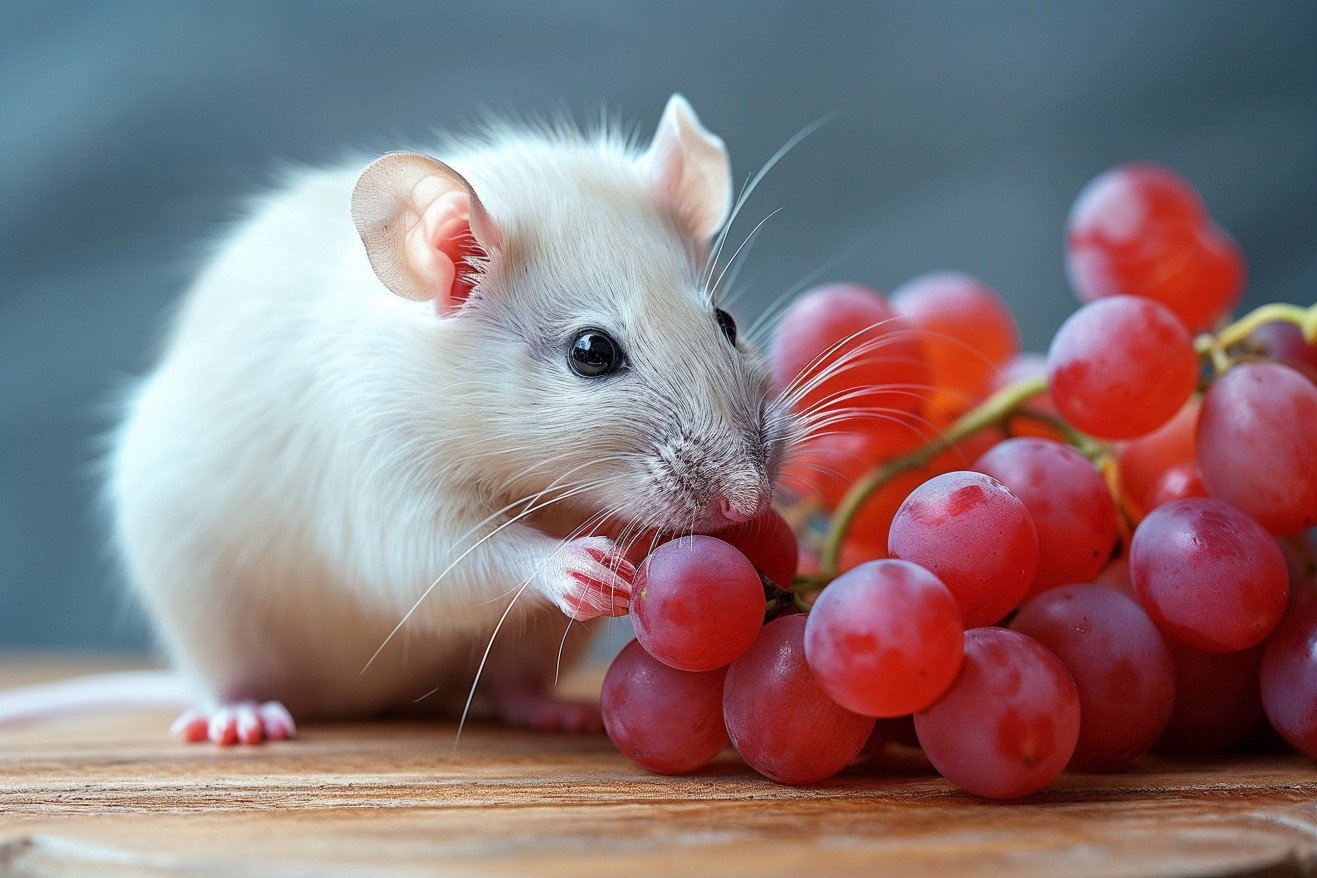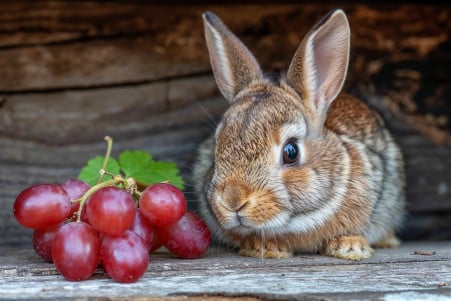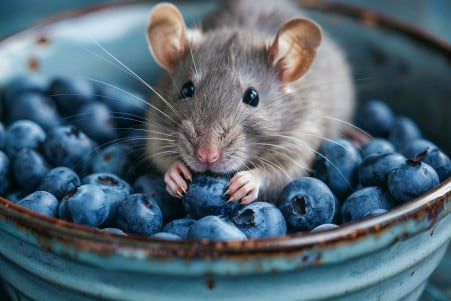Can Rats Eat Grapes? Healthy Snacking for Your Rodent
5 February 2024

If you have a pet rat, you may want to share your favorite snacks with your furry friend. But can rats eat grapes? The answer is yes, rats can eat grapes, but they should be fed to them in moderation and only as an occasional treat. Grapes are not poisonous and can provide vitamins and hydration.
However, because they contain a lot of sugar, it’s important to be careful about how many grapes you give your pet rat. Overconsumption can lead to obesity and digestive problems, especially in older and overweight rats.
To help rat owners better understand this nutritional concern, we’ve taken a look at several scientific papers and review articles on animal nutrition and physiology. We’ve summarized the results of veterinary studies, nutritional assessments, and research on the metabolic impact of sugar in rats.
Our aim is to offer a well-rounded perspective on where grapes might fit into a rat’s diet so that you can ensure the health and happiness of your tiny, beloved pet.
Can rats have grapes as part of their diet?
Grapes: A Healthy Snack to Add to Your Rat’s Diet
Grapes have been grown as a juicy snack since 6500 BC, and they also have a number of health benefits for rats. Each grape is packed with essential vitamins and minerals, making them a healthy addition to your rat’s diet.
According to Nutrisense Journal, grapes are especially high in vitamins C, K, and B12, copper, potassium, and antioxidants. These vitamins and minerals have a number of health benefits for rats, from vitamin C’s support of the immune system to vitamin K’s support of bone health.
In addition, Nutrisense Journal points out that grapes are made up of 80% water, which can help keep rats well-hydrated. This can make grapes a particularly appealing snack, especially in the summer or for rats that need extra hydration.
Research on grape antioxidants, including the popular resveratrol, has shown that they may help lower blood sugar levels and improve outcomes for people with type 2 diabetes, which could mean similar benefits for rats. In addition, studies have shown that the anti-inflammatory effects of these antioxidants may help protect against diseases caused by oxidative stress.
That said, it’s important to make sure that you’re adding grapes to your rat’s diet in a way that takes into account their natural omnivorous diet. Squeaks and Nibbles suggest adding small, washed, organic grapes to your rat’s diet to give them a range of fresh nutrients. Grapes should be part of a varied diet that includes commercial rat nuggets and other fruits and vegetables, not a main food source.
How to Make Sure Your Rat’s Diet Is Balanced
Rats are omnivores, which means they need a diverse diet to stay healthy. The best diet for a pet rat is one that is similar to what a wild rat would eat, and that means a diet that is primarily made up of commercial rat nuggets or blocks, which are specially formulated to have the right nutrients, according to the Rat Guide.
These staples should be the main part of a rat’s diet to make sure they get all the vitamins and minerals they need.
Fruits and vegetables can be added to a rat’s diet to give them extra nutrients. The PDSA says that these should be given in small amounts to avoid upsetting a rat’s stomach, and that safe options include carrots, broccoli, and the occasional grape. Grapes can be a healthy treat for rats, but they are high in sugar, so they should be given in moderation, which will be discussed in more detail below.
It’s also important to know what not to feed your rat. The Lafeber Company says that there are several foods that are toxic to rats, including green potato skins, raw beans, and citrus peels. Raisins, rhubarb, and walnuts are also toxic to rats and should never be part of their diet.
In short, a rat’s diet should be based on specially formulated rat food with fruits and vegetables added as a treat. By choosing foods carefully, you can make sure your rat stays healthy and doesn’t accidentally eat something that could make them sick.
The Bitter Truth: Sugar and Rats’ Health
While the sugar in grapes isn’t toxic in the short term, it can still have a number of impacts on rats’ health, especially when it comes to their blood sugar. As noted in Nutrisense Journal, even though grapes have a low glycemic index, rats should still be careful about how much fructose and glucose they consume, especially given the limited nature of their diet.
A team of researchers at the University of Michigan, led by Monica Dus, found that a high-sugar diet led to the desensitization of the rats’ sweet taste receptors, reducing the nerves’ sensitivity by almost 50%. This could change a rat’s taste preferences and metabolism, leading them to overconsume sweet foods when they are available, according to University of Michigan News.
In addition to the impact on taste, sugar has a number of other effects on the rat microbiome. As shown in a study in PMC by Michael I. Goran, added sugars can change the gut microbiome in rats, even when they aren’t obese. These changes in the gut flora may impact digestion and other aspects of health, which underscores the importance of a well-rounded diet.
Even when it doesn’t lead to obesity, a high sucrose diet can lead to systemic and cerebral inflammation, according to a study by Damion H. R. Stimson that appeared in Scientific Reports. This means that rats that eat a diet high in sugar over the long term may experience inflammation that impacts the body and brain, even if it doesn’t directly lead to obesity.
Given these studies, rat owners may want to think twice about feeding their pets grapes, especially when you consider the way the sugar in the fruit can impact their taste perception and overall health.
Proper Serving: How to Give Grapes to Your Rat
Because of the sugar content, it’s important to make sure that you’re not giving your rat too many grapes. According to Understanding Pet Fancy Rats, one whole grape or 1/4 to 1/2 of a small grape is a good serving size for rats who are watching their weight.
To make sure that your rat can eat the grapes safely and without choking, it’s best to cut the grapes into smaller, bite-sized pieces, which is recommended by Squeaks and Nibbles, especially for smaller rats or rats that tend to eat their food quickly.
As with any new food, it’s important to introduce grapes to your rat’s diet slowly. The PDSA recommends that you introduce new foods slowly over a period of a few days to make sure that your rat’s digestive system can handle it.
Start with a small piece of grape and see how your rat reacts to it. If everything seems fine, you can increase the serving size a little bit at a time.
After you introduce grapes to your rat, it’s important to pay attention to their behavior and health. Look for changes in energy levels, which could be a sign of an upset stomach, as noted by Understanding Pet Fancy Rats.
If you notice that your rat is acting lethargic or hyperactive after eating grapes, it’s best to take them out of their diet. This way, you can make sure that the grapes aren’t causing any long-term side effects.
By paying attention to your rat and making sure that grapes are only a small part of their diet, you can make sure that your pet rat can enjoy this sweet treat without any issues.
Conclusion: Can Rats Eat Grapes?
In summary, rats can eat grapes as long as they are fed to them in moderation. Grapes are full of vitamins, minerals, and hydration, but they are also high in sugar, so it’s important not to overdo it. As we’ve learned, moderation is key, as overconsumption of sugary foods like grapes can lead to health issues, including obesity, changes in taste perception, and alterations in the gut microbiome, which may lead to systemic inflammation.
It’s important to ensure that your pet rat is getting a well-balanced diet. This means that you should feed them a staple diet of commercial rat blocks or nuggets and supplement their diet with fruits and vegetables, including grapes. A well-balanced and healthy rat diet is all about variety without overindulgence.
For rat parents, providing a healthy and well-rounded diet for your pets is an essential part of taking care of them. By ensuring that grapes are a small part of a well-balanced diet and monitoring your rat’s response to them, you can make sure that your rat can enjoy this sweet treat without any negative side effects.
After all, your rat’s health is in your hands when it comes to their diet, proving that good things can come in small packages—or small servings.


